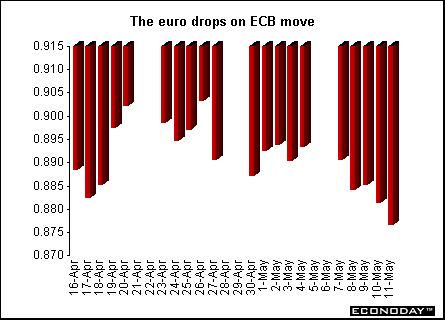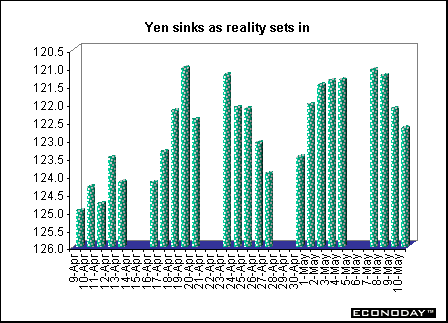
Currencies
If the equities markets liked the twin rate cuts, the foreign exchange markets did not. The euro, after a brief spurt upward, sank like a lead balloon on the ECB's action. The foreign exchange markets were in disarray after the surprise - no shocking - reduction. Traders huffed and puffed about the ECB's credibility being damaged because of the cut. After all, they were just beginning to believe the constant stream of anti-inflation rhetoric.

Although market participants finally got what they had been clamoring for, they chose to punish rather than reward the euro, as the ECB's action was seen as "too little too late" and a blow to ECB credibility. Strategists said that the ECB press conference did not provide any logical reasons for the rate cut. Market players were dismayed that the ECB did not come right out and admit their concerns about an EMU economic slowdown rather than giving a song and dance about waning inflationary pressures in the medium term (18 months from now).
The yen initially rose after Prime Minister Junichiro Koiyami laid out his plans in the Japanese parliament, but then it oozed lower along with the Nikkei. Reality that things weren't going to be fixed overnight took market participants back to where they were. Investors are very cynical about whether the new prime minister will succeed in turning the economy around. With parliamentary elections slated for July, there isn't much hope that much will get done before then. There are some suggestions that the Prime Minster's honeymoon already may be winding down, and this might be contributing to yen weakness. The yen was all but forgotten Thursday and Friday as traders fretted over the ECB's untelegraphed rate cut.

Koizumi outlined a fiscal reform package that would cap new debt issuance at Y30 trillion yen over the next financial year and would limit JGB issuance. Koizumi also laid the framework for a cut in the capital gains tax to lure investors back into stocks and confirmed his intention to privatize the Japanese postal system. However, he did not provide details in many areas. He did not set a specific date for securities related tax reforms or the start of a fiscal system overhaul for example. He also had no specifics on plans to limit bank stockholdings. However, most analysts are preferring to wait for more specifics on how exactly he will implement the necessary structural reforms before wholeheartedly embracing the pro-yen movement. Analysts are concerned that the LDP announcement early Tuesday postponing the government's stock repurchase plan until September may mean that the needed changes will not be as forthcoming as market participants would like.
 |


Introduction • Global Stock Market Indexes • Recap of Global Markets • Currencies • Indicator Scoreboard

The Bottom Line • Looking Ahead
|